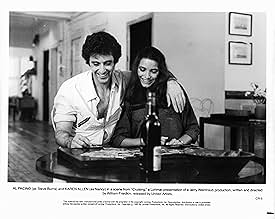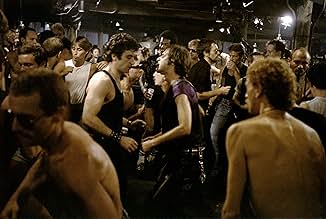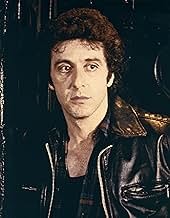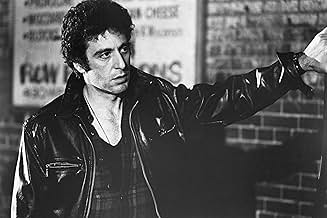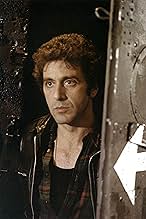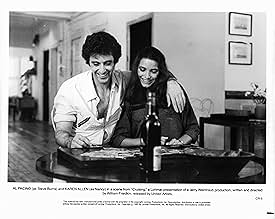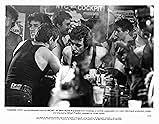A police officer goes undercover in the underground S&M gay subculture of New York City to catch a serial killer who is preying on gay men.A police officer goes undercover in the underground S&M gay subculture of New York City to catch a serial killer who is preying on gay men.A police officer goes undercover in the underground S&M gay subculture of New York City to catch a serial killer who is preying on gay men.
- Awards
- 5 nominations
Ed O'Neill
- Det. Schreiber
- (as Edward O'Neil)
- Director
- Writers
- All cast & crew
- Production, box office & more at IMDbPro
Storyline
Did you know
- TriviaTwo of the notorious gay bars featured in the film - Mine Shaft and Eagle's Nest - eventually barred William Friedkin.
- GoofsWhen the first victim gets stabbed blood is shown running off his shoulder but the knife is spotless.
- Quotes
Steve Burns: Hips or lips?
- Crazy creditsThe film only opens with the title in large letters, across the screen. It is only at the end where the filmmakers are credited.
- Alternate versionsUK cinema and 1987 video versions were cut by 54 secs by the BBFC. The 1997 Maverick Directors video release was cut by 39 seconds to remove subliminal shots of anal sex during the murder scenes (one of which appears in the film though heavily darkened) and to edit a pan shot of a gay bar interior and shots of a knife being traced over a bound victims body. Although the uncut version was shown by Sky TV the film was resubmitted to the BBFC in 2003 for a FilmFour showing and many cuts were restored apart from a 1 sec edit to remove the subliminal shots. For the initial release on UK DVD in 2008 all the cuts were waived.
- SoundtracksThree-Day Moon
Performed by Barre Phillips
Featured review
William Friedkin is a mysterious, often mystifying film-maker. Although he rose to prominence at the same time as the rest of the so-called 'movie brat' generation of directors (Coppola, Spielberg, Scorsese, DePalma, et al.), he stands apart, even from a group as essentially disparate as this one. For one thing, his films lack the intertextual references and cinematic stylisation common to most of the other members. If he has an over-riding aesthetic, it would be the ugliness of the majority of human existence. He's not interested in prettifying his images or indulging in style-for-style's sake; which is not to say that his film's don't exhibit inventive and effective technique, just that this technique is always at the service of the story he's telling, and is often blunt and brutally effective in it's employment. All of this no doubt arises from his start in documentary film-making. Friedkin is particularly good at depicting the menace of urban environments, and the locales of a lot of his films are frightening, tangibly real places. Witness the sequences involving Karras' aged mother in 'The Exorcist', which for me are the most disturbing scenes in an often terrifying film. As we observe the elderly lady living alone in her shabby apartment in a crime-ridden neighbourhood, we realise that this is the existence that many millions of people are forced to endure, and it's oppressiveness adds immeasurably to the psychological impact of the film as a whole. We share Karras' fear and traumatising guilt that she died alone in such circumstances, and the special effects trickery of the climax is lent a genuine resonance.
Because of the stark, seemingly 'artless' force and apparent misanthropy of much of his work, a number of otherwise perceptive commentators dislike Friedkin intensely. Pauline Kael was extremely cool about 'The French Connection' and absolutely hated 'The Exorcist'. David Thompson described him as "essentially incompetent", bludgeoning the audience with blatant and obvious effects. In fact, Friedkin's best work is highly sophisticated in it's use of sound and music, and employs often visceral imagery to telling and subversive effect. However, some of his films ARE genuinely bloody awful, or at least depressingly mediocre. The very inconsistency of his work lies at the centre of the mystery that is his career. He seems to me to be a fiercely intelligent man whose art is driven by his life rather than the culture of film, and whose reportedly quixotic, often self-destructive personality in no small measure accounts for the expansive peaks and troughs of his cinematic achievements.
Friedkin has reassuring or comforting his audience way down the list of his priorities. In the case of 'Cruising', he neglected to add them at all. Because of this, 'Cruising' is a very difficult film to watch. Most film-makers, were they making a film set in such an alien and frightening environment, would go overboard on providing us with at least one protagonist we could identify with. But Friedkin takes the very opposite route and presents us entirely with characters who are abhorrent, sleazy or totally ambiguous. Indeed, ambiguity is the film's raison d'etre - we are never sure of anything, and this becomes both the pictures great strength and source of much audience frustration. It seems that unlike, say, Spielberg, who continually seeks the approbation of his audience, Friedkin actively resents his (or rather, their preconceptions and certainties), leading him to consistently challenge and upset them. This can be exciting to those who value such seditious manouveres, but dispiriting and destabilising for those that don't.
The major problem with evaluating 'Cruising' is that the film as it currently exists is seriously incomplete (apparently having been shorn of some 40 minutes of footage by the censors!). I suspect that a 'directors cut' should it ever emerge, although no doubt clarifying certain issues, would overall fail to dispel the central ambiguity that is so infuriating and troubling to the majority of the audience, and that lies at the heart of Friedkins vision. "What interests me is the very thin line between good and evil", the director once said when asked to provide a thematic overview of his work - and this is the core of 'Cruising'.
I would urge you to watch the film. It is a uniquely dark, brave piece somewhat compromised by well documented production difficulties and the censors scissors. It has a sinister, compelling momentum and wonderfully ugly, grainy textures that seep into your pores leaving you uncomfortable and unsettled. Sometimes a feel-bad movie can be as bracing as a winter morning. 'Cruising' is such an experience, and a fascinating, provocative one at that.
Because of the stark, seemingly 'artless' force and apparent misanthropy of much of his work, a number of otherwise perceptive commentators dislike Friedkin intensely. Pauline Kael was extremely cool about 'The French Connection' and absolutely hated 'The Exorcist'. David Thompson described him as "essentially incompetent", bludgeoning the audience with blatant and obvious effects. In fact, Friedkin's best work is highly sophisticated in it's use of sound and music, and employs often visceral imagery to telling and subversive effect. However, some of his films ARE genuinely bloody awful, or at least depressingly mediocre. The very inconsistency of his work lies at the centre of the mystery that is his career. He seems to me to be a fiercely intelligent man whose art is driven by his life rather than the culture of film, and whose reportedly quixotic, often self-destructive personality in no small measure accounts for the expansive peaks and troughs of his cinematic achievements.
Friedkin has reassuring or comforting his audience way down the list of his priorities. In the case of 'Cruising', he neglected to add them at all. Because of this, 'Cruising' is a very difficult film to watch. Most film-makers, were they making a film set in such an alien and frightening environment, would go overboard on providing us with at least one protagonist we could identify with. But Friedkin takes the very opposite route and presents us entirely with characters who are abhorrent, sleazy or totally ambiguous. Indeed, ambiguity is the film's raison d'etre - we are never sure of anything, and this becomes both the pictures great strength and source of much audience frustration. It seems that unlike, say, Spielberg, who continually seeks the approbation of his audience, Friedkin actively resents his (or rather, their preconceptions and certainties), leading him to consistently challenge and upset them. This can be exciting to those who value such seditious manouveres, but dispiriting and destabilising for those that don't.
The major problem with evaluating 'Cruising' is that the film as it currently exists is seriously incomplete (apparently having been shorn of some 40 minutes of footage by the censors!). I suspect that a 'directors cut' should it ever emerge, although no doubt clarifying certain issues, would overall fail to dispel the central ambiguity that is so infuriating and troubling to the majority of the audience, and that lies at the heart of Friedkins vision. "What interests me is the very thin line between good and evil", the director once said when asked to provide a thematic overview of his work - and this is the core of 'Cruising'.
I would urge you to watch the film. It is a uniquely dark, brave piece somewhat compromised by well documented production difficulties and the censors scissors. It has a sinister, compelling momentum and wonderfully ugly, grainy textures that seep into your pores leaving you uncomfortable and unsettled. Sometimes a feel-bad movie can be as bracing as a winter morning. 'Cruising' is such an experience, and a fascinating, provocative one at that.
- LewisJForce
- May 4, 2004
- Permalink
- How long is Cruising?Powered by Alexa
Details
- Release date
- Countries of origin
- Language
- Also known as
- William Friedkin's Cruising
- Filming locations
- Production companies
- See more company credits at IMDbPro
Box office
- Budget
- $11,000,000 (estimated)
- Gross US & Canada
- $19,798,718
- Gross worldwide
- $19,815,314
Contribute to this page
Suggest an edit or add missing content



